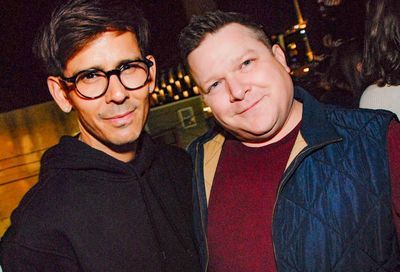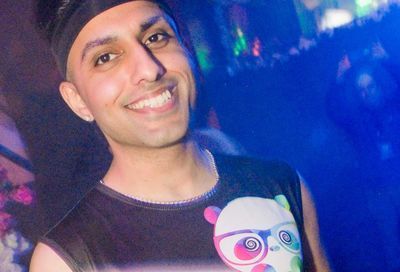In the House
Bet Mishpachah opens arms, homes and hearts
In New York City, Congregation Beth Simchat Torah claims to be the world’s largest GLBT synagogue. Beth Chayim Chadashim, founded in 1972 in Los Angeles, claims to be the world’s oldest. But what are bragging rights when you’re trying to get closer to God?
In the District, Bet Mishpachah is a congregation of hundreds founded in 1975. More importantly, to a member such as Allan Armus, Bet Mishpachah is family.
”I came to Washington and Bet Mishpachah in the fall of 1983,” remembers Armus, then a young transplant from New Jersey and now the congregation’s treasurer. ”I sought it out because I knew very few people in the area. It quickly became my social and spiritual home.”
A sense of homecoming is likely the exact feeling Bet Mishpachah founders had in mind for their congregation, in that the Hebrew bet mishpachah translates to ”house of family.”
Beyond the obvious affinity between a gay man and a gay congregation, Armus says he also appreciated Bet Mishpachah’s style — something he calls ”liberating” — when compared to the mainstream synagogue of his youth. Raised as a Conservative Jew, Armus says his upbringing could more aptly be dubbed ”conservadox,” meaning his officially Conservative tradition leaned heavily toward the Orthodox, the most socially conservative branch of Judaism, particularly in regard to homosexuality.
Armus says the sense of liberation he found at Bet Mishpachah was found in both subtle and overt ways. For example, it was with the congregation that he first saw women leading services or heard English, rather than only Hebrew. While Armus says the traditions he grew up with conditioned him with rote learning, Bet Mishpachah took him down a more thoughtful spiritual path.
”All of the elements of what I was raised with are there, but now I understand them more and appreciate them more,” Armus says. ”I don’t rush through the prayers. I slow down to read them, thanks to Bet Mishpachah.”
He’s also achieved a new level of personal growth.
”It also helped me on my path to integrate myself: gayness, Jewish-ness, maleness, physicality — all can be united at Bet Mispachah,” he says.
Some of those elements from Armus’s upbringing also serve as testament to Bet Mishpachah’s reverence for Judaic tradition, silencing any critic who may see GLBT congregations as some sort of ”new age” heresy. The congregation’s first Torah scroll, for example, on permanent loan from London’s Westminster Synagogue, first belonged to a 500-year-old Jewish community in Eastern Europe, Dolni Kounice, wiped out during the Holocaust.
The fruits of Armus’ relationship with Bet Mishpachah go, however, even further than the spiritual and social. He met his late partner, Mark Goldfarb, there in 1985. Goldfarb, says Armus, was a tech-savvy, deaf man who helped bring the congregation online. And after he died, the congregation was there to help Armus mourn.
”They were here, conducting his funeral, unveiling his memorial, coming to my home, making sure I wasn’t left alone.”
Armus makes great effort during Passover to make sure others aren’t alone, either, thanks in part to Bet Mishpachah’s ”Seder Match.” It’s a way to bring together those congregants who will be serving as Seder hosts with those congregants who would otherwise have no Seder to attend. Those lucky enough to find themselves at Armus’ home won’t be going home hungry.
”For a number of years we would hold a Seder with 70 to 90 people showing up. It got more and more difficult, logistically. It was chaotic at best,” he says. ”Now community members hold Seders and invite people they don’t know necessarily. Part of the Passover tradition is welcoming strangers into your home, anyone who is hungry.”
Armus says he’ll be cooking for a week before his two Passover Seders, making everything from scratch — matzoball soup, beef brisket, rack of lamb, sponge cakes, ratatouille — right down to the tzimmes: ”It’s kind of like a stew with sweet potatoes, raisins and honey.”
There is one exception, though. Armus buys his gefilte fish pre-made, rather than hours of stewing, mincing, spicing and balling fish for this Passover favorite. ”My mother made great ones.”
Armus, with a soft laugh, admits he does not.
For more information about Bet Mishpachah, visit www.betmishpachah.org.

Support Metro Weekly’s Journalism
These are challenging times for news organizations. And yet it’s crucial we stay active and provide vital resources and information to both our local readers and the world. So won’t you please take a moment and consider supporting Metro Weekly with a membership? For as little as $5 a month, you can help ensure Metro Weekly magazine and MetroWeekly.com remain free, viable resources as we provide the best, most diverse, culturally-resonant LGBTQ coverage in both the D.C. region and around the world. Memberships come with exclusive perks and discounts, your own personal digital delivery of each week’s magazine (and an archive), access to our Member's Lounge when it launches this fall, and exclusive members-only items like Metro Weekly Membership Mugs and Tote Bags! Check out all our membership levels here and please join us today!























